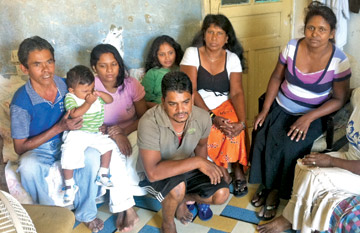|
Syria:
Emergency evacuation on the cards if situation worsens
By Manjula FERNANDO
|

Some of the Sri Lankans still in Syria pose for a photograph in
their current residence in Old Mazze district, Damascus. Extreme
left Rahim, his son and wife, next to them is the couple, Nayana
and Dammith, waiting assistance to return home.
|
As the ground battles in Syria shifted from the capital Damascus to
Aleppo, the largest city in the country, located northwest and 310 km
off Damascus intensified thirty five Sri Lankans were still employed
there, anxiously praying that normalcy will return soon. Three of them
have lost their jobs due to raging battles and were anticipating
sponsored air tickets to fly back home. They have been without work for
the past four weeks.
Dasun (pseudonym) who is working in a foreign diplomatic mission
speaking to the Sunday Observer on the phone said, although the fighting
has eased off in Damascus, the situation was still volatile.
"It is calm and relatively quiet on the surface, with just occasional
explosions being heard, but we are not quite sure what will happen the
next moment."
He is working for a foreign mission in the Syrian capital and has no
plans to come back yet since the job he secured is well paid and hard to
replace.
"We are all living here in the capital, we stayed here even when
intense fighting was going on. " No Sri Lankan was injured in the
fighting between the rebels and the Syrian government forces, that has
been raging since early this year. Over 1000 Sri lankan migrant workers
were living in Syria a few months back but after the clashes grew into a
full scale civil war, almost all of them have fled the country.
Sri Lankan ambassador to Lebanon, Ranjith Gunaratna is in close
contact with the Sri Lankans who are still in Syria. "We have already
communicated an emergency evacuation route for them if the need arises.
|

Ambassador Ranjith
Gunaratna |
They have been asked to travel by land to the Lebanese-Syrian border
which is about an hours drive and from there transport and temporary
shelter will be provided until their return home," he told Sunday
Observer in a telephone interview.
The Sri Lankans attached to diplomatic missions in Syria will have
easy pass through the boarder but those working as domestic aides or
casual workers may have to be facilitated with special arrangements to
cross the border.
The Ambassador said they were prepared to face any eventuality to get
them safely across to Lebanon if the fighting intensifies in the coming
days.
Ambassador Gunaratna is continuing negotiations with the IOM,
International Labour Organisation (ILO), Caritas and the Sri Lanka
Foreign Employment Bureau (SLBFE) to facilitate a possible mass
repatriation if Sri Lankans have to be taken out of Syria.
Twelve workers who lost their jobs or wanted to leave due to the
worsening situation arrived in Colombo last Monday (Aug 6). Of them six
were provided air tickets by the Embassy in Lebanon, funded by IOM.
They left via Damascus airport which is still functioning. In spite
of the tense situation shops remain open but prices of commodities were
sky rocketing.
Due to a power crisis, a four-hour power cut has also been imposed.
Despite their own economic woes, Sri Lankans have been providing for the
three unemployed workers, two men and a woman who were waiting to return
home. Thusith Perera 33, of Kandy had been unemployed for quite awhile.
He was doing part time for sometime. He is among the three people
waiting to come back with the intervention of the Sri Lankan embassy in
Lebanon. The other two, a husband and a wife, are Bengalage Nayana
Nilanka, 32 of Narammala and Dammith Nishantha de Silva, 37 of Kantale.
The Ambassador in Lebanon said there were isolated cases of fighting
in the border villages within Lebanon between groups supporting and
opposing Syrian leader Assad. He said there was no urgent concern but
his office is on alert for any need to get Sri Lankans in such areas
evacuated if the need arises.
According to unofficial sources there is a population of nearly
85,000 migrant workers in Lebanon, most of whom are domestic helpers. |

